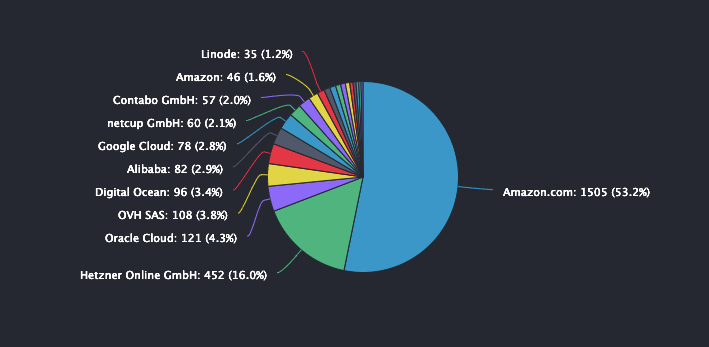- Hetzner Online has proscribed its hosting services for any application involving mining.
- The crypto community has reacted negatively to Hetzner’s decision, expressing worries about ETH’s reliance on centralized services.
- Statistics show that over 70% of ETH nodes run on Amazon Web Services (AWS), Hetzner Online, and Oracle Cloud.
Hetzner Official, a data center based in Germany, has prohibited the use of its hosting services for any application involving the mining of Bitcoin, Ethereum, or any cryptocurrency.
The corporation explained its position in a Reddit thread last Tuesday, claiming that both Proof-of-Stake (PoS) and Proof-of-Work (PoW) apps are subject to its restriction for mining-related purposes. In their words:
Using our products for any application related to mining, even remotely related, is not permitted. This includes Ethereum. It includes proof of stake and proof of work and related applications. It includes trading.
The cryptocurrency community has reacted negatively to Hetzner’s remarks. Many have accused the corporation of hosting mining and other cryptocurrency-related apps for years without declaring this in their terms of service.
The company acknowledged that many Ethereum users relied on Hetzner and stated that the situation is under internal review.
Ethernodes.org shows that 16.0% of Ethereum’s validator nodes run on Hetzner’s servers. Consequently, the company’s new position on PoS apps might significantly impact the Ethereum ecosystem.
As the Merge draws nearer, many people have expressed their worries about the existing centralization of Ethereum’s validator nodes as a considerable chunk of them run on centralized authorities. According to statistics, over 70% of ETH nodes are hosted by the three cloud service providers Amazon Web Services (AWS), Hetzner Online, and Oracle Cloud. AWS hosts more than 53% of the Mainnet nodes, whereas Hetzner hosts 16% of them.

Chart showing the distribution of Ethereum Mainnet nodes by cloud providers (Source: Ethernodes.org)
A crypto enthusiast, @maggielove, argued that “Ethereum cannot be decentralized if the stack is not decentralized.”
Ethereum cannot be decentralized if the stack is not decentralized…
Where is the dialogue on this?
69% of hosted nodes on the Ethereum Mainnet, with over 50% of that coming from Amazon Web Services (AWS), over 15% from Hetzner and 4.1% from OVH. pic.twitter.com/eiNRekr3mw
— maggie love @ )'( (@maggielove_) August 25, 2022
Maggie goes on to add that hardware infrastructure providers are important participants in blockchain ecosystems and that designing for decentralization matters.
Disclaimer: The information presented in this article is for informational and educational purposes only. The article does not constitute financial advice or advice of any kind. Coin Edition is not responsible for any losses incurred as a result of the utilization of content, products, or services mentioned. Readers are advised to exercise caution before taking any action related to the company.










